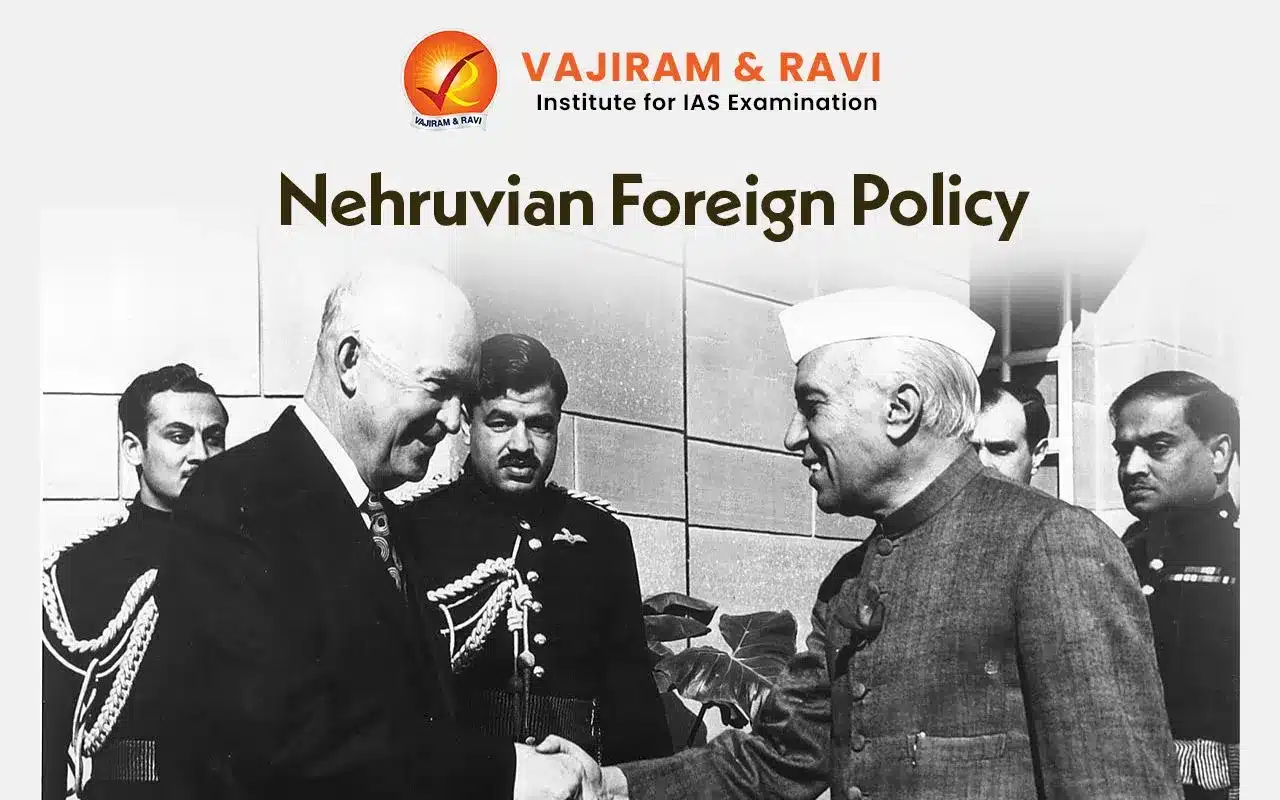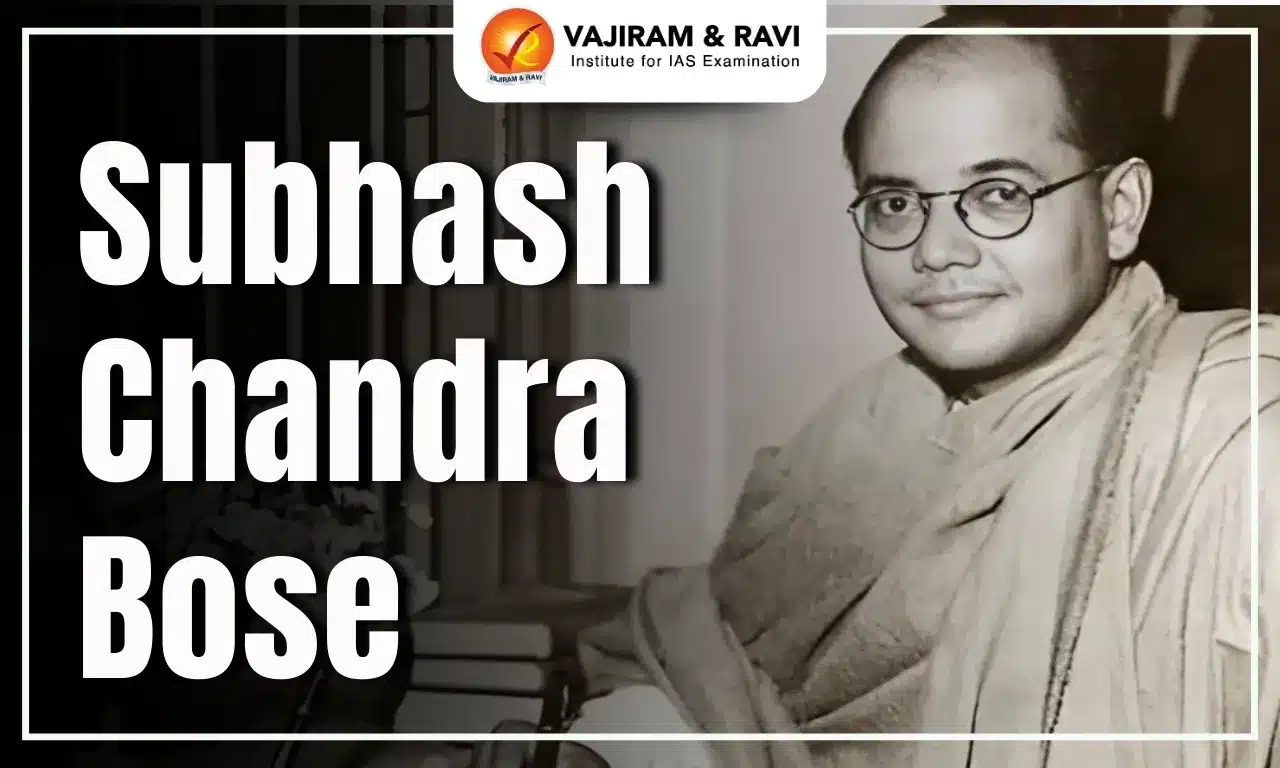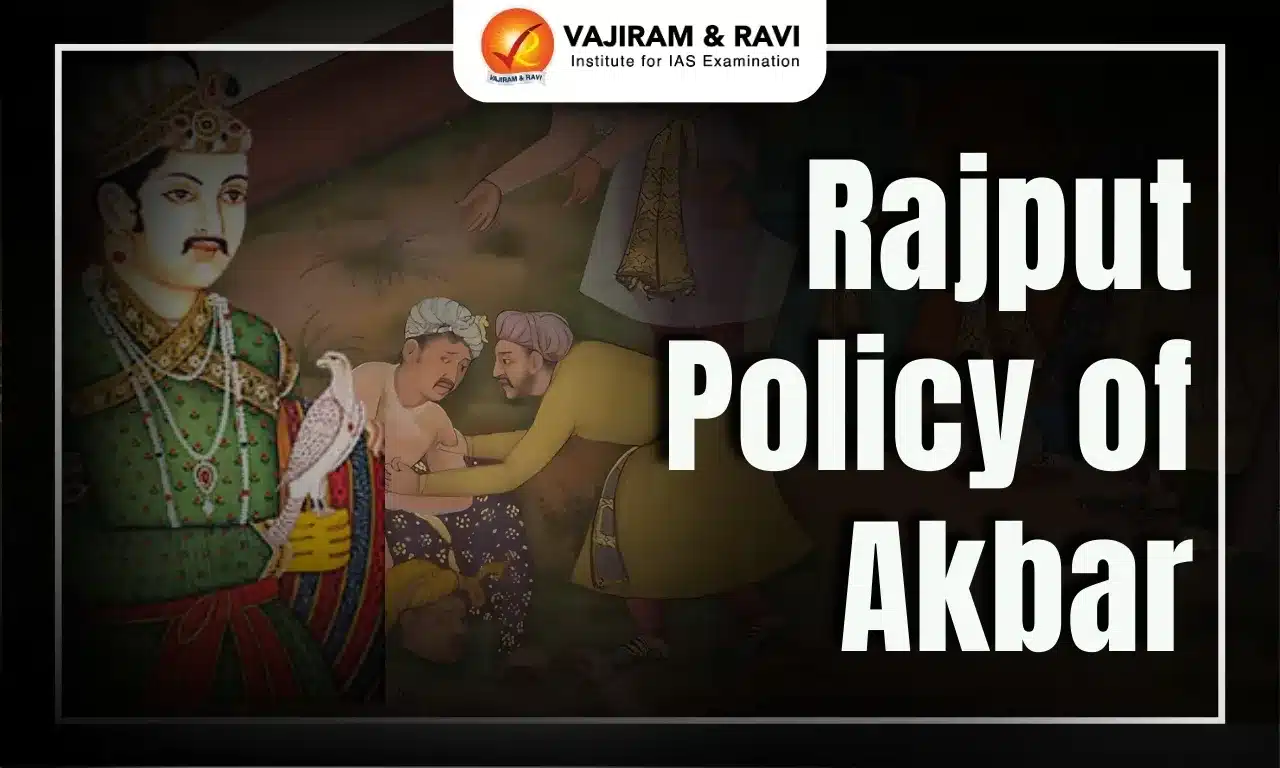The Nehruvian Foreign policy, during the Nehruvian Era, (1947 to 1964) was known for its distinctive approach to matters of foreign affairs with a blend of idealism and pragmatism. Jawaharlal Nehru’s vision transcended beyond the immediate problems of the newly constituted nation to embrace a broader goal for global peace, collaboration, and equitable development.
The key parameters of Nehru’s foreign policy were the values of mutual respect, peaceful coexistence, non-alignment with superpowersand solidarity with other developing nations. While his approach is being criticised today, his influence in creating India's diplomatic identity and contributing to world discourse remains enduring.
Basic Parameters of the Nehru’s Foreign Policy
After India gained independence in 1947, it faced numerous domestic and international challenges. Jawaharlal Nehru, as the PM, took on the leadership role to shape India's future and played a significant role in India's foreign policy. During the Nehruvian Era, India's foreign policy was primarily centred on the following fundamental principles:
- Non-alignment: Nehru championed the policy of non-alignment, advocating for India to maintain distance from both the Western and Eastern power blocs of the Cold War.
- This strategy sought to protect India's autonomy, prevent alignment with any military alliance, and allow the country to pursue its own interests without being pushed into conflict.
- Panchsheel: Nehru prioritised international peace in his policy formulation. While signing a peace treaty with China in 1954, he advocated adherence to the following five guiding principles (Panchsheel), which have since become guiding principles in India's bilateral relations with other countries.
- Mutual respect for each other’s territorial integrity and sovereignty,
- Mutual non-aggression,
- Mutual non-interference,
- Equality and mutual benefit, and
- Peaceful co-existence.
- Third World Solidarity: Nehru's foreign policy aimed to foster solidarity among newly independent nations of the so-called Third World.
- He thought that collective action was necessary to overcome common concerns including economic underdevelopment and negative colonial legacies.
- Support for decolonisation: Nehru was a vocal advocate for decolonisation and supported the independence struggles of various nations.
- He saw colonialism as a grave injustice and advocated for an end to imperialist domination around the world.
- India actively supported the decolonisation efforts in Asian, African, and Latin American countries, advocating for their independence from colonial rule.
- Anti-apartheid stance: India openly supported the policy of anti-apartheid, condemning the system of racial segregation in South Africa and advocating for its eradication.
- Promotion of disarmament: Nehru emphasised the importance of disarmament as a key factor in achieving world peace.
- He demonstrated commitment to disarmament at the international level by supporting initiatives such as the formation of the Atomic Energy Commission in India in 1947 and sponsoring the Eighteen Nations Disarmament Conference in 1962.
India’s Relation with its Neighbouring Countries under Nehru
Nehru viewed India’s neighbours through a broad spectrum and within a broader Asian framework. He was partially successful in cultivating a relationship with neighbours.
| Country | Key Aspects |
| India-Pakistan |
- Background: During Jawaharlal Nehru's tenure as Prime Minister of India, India-Pakistan relations were marked by a mix of cooperation, conflict, and attempts at reconciliation. The aftermath of the partition left both India and Pakistan with a deficit of goodwill. - Kashmir Issue: The Kashmir conflict began in October 1947 when tribal militia, backed by Pakistan, infiltrated Kashmir, causing destruction and chaos in the region.
- Indus Water Treaty: The equitable distribution of water from the Indus system has been a contentious issue between India and Pakistan since the partition in 1947.
|
| India-China |
- India established diplomatic relations with China under Chiang Kaishek's Nationalist Government and later recognised the new government led by Mao Zedong (or Mao Tse Tung) after the Communists took over China in 1949. - Developments in Tibet and Panchsheel: China entered and occupied Tibet in 1950. In 1954, Nehru recognised China’s occupation of Tibet without any quid-pro-quo and signed the Panchsheel Agreement. - On 31 March 1959 after a failed uprising against Chinese rule, the Dalai Lama fled to India and was offered political asylum which impacted the relationship. - Border disputes and negotiations: China claimed the Aksai Chin territory, leading to border disputes. In 1960, negotiations took place between Chinese and Indian officials but failed. - Sino-Indian War, 1962: In October 1962, China launched an attack on India in NEFA and Ladakh. India suffered a defeat in the war. - Consequences: India's self-respect was impacted, and the policy of non-alignment came under scrutiny.
|
| India-Nepal |
- In July 1950, India and Nepal signed a Treaty of Friendship. India recognised Nepal's sovereignty, territorial integrity, and independence. - In 1950, India also played an important role in ceasing the regime of Rana in Nepal and re-established the rule of Maharaja. - Tribhuvan Bir Bikram Shah had suggested to Nehru that Nepal be made a province of India. But Nehru declined the offer on the grounds that Nepal must remain an independent nation. - Nehru wanted Nepal to be a buffer between India and China. - Nepal was included in the UN as an independent nation in 1955 through the efforts of India. |
| India-Bhutan |
- In 1949, India and Bhutan signed a Treaty for perpetual peace and friendship. - Nehru visited Bhutan in 1958, a landmark event in Indo-Bhutan relations. - He promised the independence of Bhutan in case of any aggression. - The First Five Year Plan financed by India was launched in 1961. - India agreed to exercise non-interference in the internal administration of Bhutan. - Bhutan agreed to be guided by the advice of the Government of India in matters concerning its external relations. |
| India-Sri Lanka |
- India and Sri Lanka gained independence from British rule in 1947 and 1948, respectively. - The early years of the India-Sri Lanka relationship were not very friendly. - Sri Lanka developed its independent and cordial relations with Pakistan and China to increase leverage against India. - These relations changed rapidly after 1956, after the coming of a new government in Sri Lanka. - Both adopted a similar approach on the Tibet issue of 1959. - Sri Lanka supported the accession of Goa, Daman and Diu in India after liberation from the British in 1960. - After the death of Nehru, Sri Lanka declared a public holiday on 28th May in honour of Nehru. |
| India-Burma |
-The relationship between the two countries was strengthened by the personal friendship that existed between the two Prime Ministers Nehru and U Nu. - At the time of the internal crisis Myanmar faced just after its independence in 1949, India extended assistance and help to restore normalcy to its neighbour. - In 1951, India and Myanmar signed a Treaty of Friendship. - Sino-Burmese border agreement and a treaty of friendship and mutual non-aggression in 1960 impacted Indo-Burmese relations. - Myanmar showing a neutral stand on the Sino-Indian war of 1962 was interpreted as ‘pro-Chinese’ by India and the relationship got disturbed. - The 1962 coup in Myanmar which heralded military rule brought about a complete disruption in bilateral relationships. |
Significance of Nehruvian Foreign Policy
The objectives enshrined by the first Prime Minister in India’s foreign policy remain relevant even today and have assumed greater importance in the era of economic liberalisation and a multi-polar world.
- Strategic Autonomy: The NAM, started by Nehru, has its relevance today when the era of unipolarity in the global order is over and a new phase of the Cold War is seemingly glooming over the world.
- For example, In the context of the Russia-Ukraine war, India's steadfast neutrality and ongoing engagements with both Russia and the US have underscored the nuanced nature of its foreign policy.
- India abstained from voting on the UN proposal condemning Russia's aggression, choosing a path of strategic autonomy and multi-alignment, all while preserving the core tenets of non-alignment.
- Independent Foreign Policy: The legacy of pursuing an independent foreign policy despite pressures from superpowers reflects the importance of safeguarding national interests and sovereignty in a multipolar world.
- It has helped India on many occasions.
- Asian Identity: Nehru's focus on strengthening ties within Asia remains relevant in the context of Asia's growing influence in global affairs today and the potential for intra-regional cooperation.
- Pursuit of Global Peace: In an era marked by rapid changes and complex challenges, India engages with various power blocs constructively and its ability to navigate complex diplomatic waters showcases the country as a potential mediator in international conflicts, embodying the principles of cooperation, peace and mutual respect.
- India has established itself as a mouthpiece of global peace and responsible power in today's era, even after acquiring nuclear weapons. Nehru has a significant role in this.
- Voice of Global South: Nehru’s solidarity for the Third World is reflected in India's increasing footprints in the Global South where it has successfully become its voice.
- This was evident in the recently successful G-20 summit in India in 2023.
Limitations of Nehruvian Foreign Policy
The Nehruvian foreign policy has also faced criticisms, some of which are being mentioned below.
- Non-alignment and Cold War dynamics: Nehru's policy of non-alignment had its limitations. India often faced challenges in balancing its relations with both superpowers, and there were instances where India's non-alignment stance was perceived as leaning towards one side or the other.
- The excessive focus on non-alignment sometimes led to missed opportunities for strategic alliances and partnerships that could have benefitted India's interests.
- Failure on the China issue: On the China issue, Nehru is blamed for having a short-sightedness approach, and believing in idealism more than realism.
- Despite getting clear negative signals from China since 1959, the Indian government did not make enough efforts to settle the border issues.
- There was also an intelligence failure regarding the infrastructural development in Tibet, near the Aksai Chin area.
- The moralpolitik and ‘third worldism’ proved useless in the crisis and compelled India to adopt a more realistic and assertive foreign policy with increased expenditure on defence.
- Failure on Kashmir Issue: The Government of India took the matter to the UNSC wherein the power politics of the Cold War prevailed instead of the merit of the case when Britain sided with Pakistan in the United Nations.
- The government should have allowed the Army to first settle its borders before going to the UN.
- Kashmir has been the most sensitive issue in the Indo-Pak relations.
- UNSC Membership: It is believed that Nehru refused the offers to join the Security Council given by the US and the then Soviet Union in 1950 and 1955 respectively, at the expense of China.
- India is still seeking to become a permanent member of the council.
- Nuclear test and NSG Membership: The policy of over-emphasis on the disarmament and civil use of nuclear technology cost India the opportunity to detonate a nuclear device, before the introduction of the Nuclear Non-Proliferation Treaty (NPT) in 1968.
- NPT recognises only P-5 members as nuclear powers, the only countries that have successfully tested nuclear weapons by 1968.
- India is making strenuous efforts now to acquire membership in the elite Nuclear Suppliers Group (NSG), which requires membership in NPT.
- Limited engagement with the global economy: Foreign policy during the Nehruvian era placed more emphasis on geopolitical and strategic issues rather than actively engaging with the global economy.
- This limited India's participation in international trade and hindered its economic development.
- Limited Regional Cooperation: Despite advocating for Third World solidarity, India's engagement with its South Asian neighbours also faced challenges.
- Relations with Sri Lanka and Pakistan remained strained, and efforts to foster regional cooperation sometimes encountered roadblocks.
Last updated on January, 2026
→ Check out the latest UPSC Syllabus 2026 here.
→ Join Vajiram & Ravi’s Interview Guidance Programme for expert help to crack your final UPSC stage.
→ UPSC Mains Result 2025 is now out.
→ UPSC Notification 2026 Postponed for CSE & IFS which was scheduled to be released on 14 January 2026.
→ UPSC Calendar 2026 has been released.
→ UPSC Prelims 2026 will be conducted on 24th May, 2026 & UPSC Mains 2026 will be conducted on 21st August 2026.
→ The UPSC Selection Process is of 3 stages-Prelims, Mains and Interview.
→ Prepare effectively with Vajiram & Ravi’s UPSC Prelims Test Series 2026 featuring full-length mock tests, detailed solutions, and performance analysis.
→ Enroll in Vajiram & Ravi’s UPSC Mains Test Series 2026 for structured answer writing practice, expert evaluation, and exam-oriented feedback.
→ Join Vajiram & Ravi’s Best UPSC Mentorship Program for personalized guidance, strategy planning, and one-to-one support from experienced mentors.
→ UPSC Result 2024 is released with latest UPSC Marksheet 2024. Check Now!
→ UPSC Toppers List 2024 is released now. Shakti Dubey is UPSC AIR 1 2024 Topper.
→ Also check Best UPSC Coaching in India
Nehruvian Foreign Policy FAQs
Q1. What are the fundamental principles underlying Panchsheel?+
Q2. What does the Indus Water Treaty of 1960 entail?+
Q3. Who signed the Panchsheel Agreement?+
Q4. What is the Indo-Nepal Treaty of Friendship?+

















